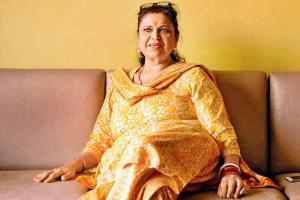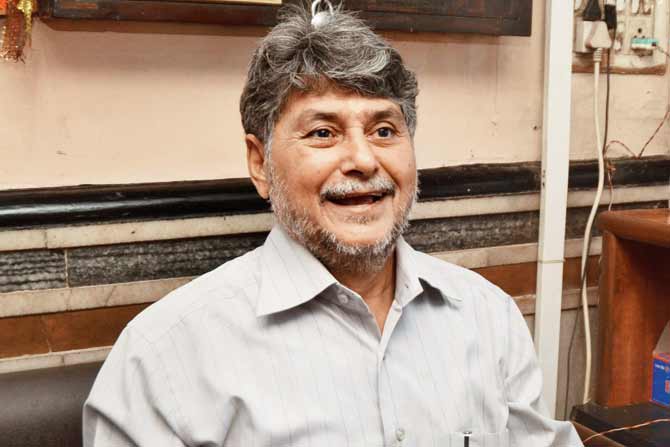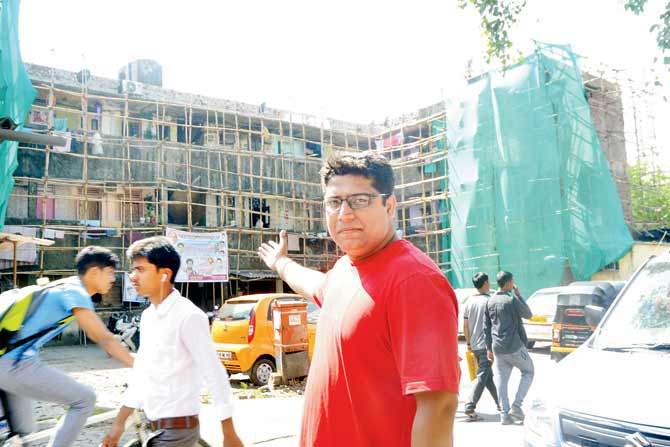As they rally for a bhavan for their community's welfare, Mumbai's Dogras discuss why they no longer wish to remain on the margins

Nidhi Sharma recently approached CM Devendra Fadnavis to facilitate allotment of a piece of land for the construction of a Dogra Bhavan. Pic/Bipin Kokate
Sitting in the living room of her Peddar Road apartment, Nidhi Sharma, daughter of late Girdhari Lal Dogra, the longest serving finance minister of Jammu and Kashmir, is furiously scrolling through her phone. She wants to show us a video that a news channel recently aired, featuring her father.
"A friend forwarded it to me. I had no idea," she laughs, her green eyes glinting. The clip has already gone viral in the community. To Sharma, this hardly comes as a surprise. "In Mumbai, we are close-knit. And, because my father devoted his life to public service, they have immense respect for him," she adds. Her words ring true. In 2015, Prime Minister Narendra Modi, while addressing the audience during GL Dogra's birth centenary described the politician as a "legend". Over 2,000 km away from J&K, the city's Dogras are ensuring that the leader's vision not just binds the community together, but also guides their actions.
ADVERTISEMENT

Vaishno Punjab, the city's oldest Dogra hotel in Chembur, started by Santram Neelkanth Sharma in 1948, is currently being run by his son Updesh
Recently, Sharma along with actors Mukesh Rishi and Preeti Sapru, approached Maharashtra Chief Minister Devendra Fadnavis to facilitate allotment of a suitable piece of land for the construction of a Dogra Bhavan. Aimed at the welfare of its community members, the facility, as per the proposal, would serve those who come to Mumbai for treatment and are hard-pressed to find an affordable accommodation. The facility, Sharma tells us, will have living rooms and dormitories for boarding and lodging facilities.
According to Krishna Pandit, president of the Dogra Samaj Trust Mumbai (DSTM), a large chunk of BMC's mathadi workers comprise the rural Dogra folk, who migrated with the hope of a better future. "They work as loaders, and because they lead invisible lives, their plight goes unnoticed," says Pandit, adding that the Bhavan will also address their needs. Actor Rishi, however, is clear that the bhavan is not just for the Dogras, but also everybody from the J&K state in need of help.

Santram Neelkanth Sharma
Making their presence felt
Relatively low-profile, it's one of the few times that the city's Dogras have made it to newsprint. Sharma agrees. "To be honest, we are all over the cultural space, but nobody knows. Take for instance, noted musicians Ustad Zakir Hussain and Pandit Shivkumar Sharma, filmmaker Ramanand Sagar, novelist Padma Sachdev and even Monica Dogra," she says. The Dogras are essentially people who inhabit the foothills of the Himalayas, and the adjoining plains between the Jhelum and the Sutlej rivers. While they are mainly concentrated in Jammu, some of them also reside in Punjab and Himachal Pradesh.
Mumbai, too, has a sizeable population. Pandit pegs it to be no less than 60,000. The DSTM, which has been in existence for nearly a decade, but was officially registered last year, aims to bring about a cultural revival and instill a sense of pride. Although the native language Dogri sounds a lot like Punjabi, there are subtle differences, points out santoor maestro Pandit Shivkumar Sharma. "There's a certain sweetness and melody to the language. And as a musician, I've always been drawn to its sounds," he says. Sharma moved to city in 1960, and since then has made Mumbai his home. "While Mumbai is karmabhoomi, Jammu is my janmabhoomi. Therefore, I have equal responsibilities towards both."

Rohit Sharma outside the refugee settlement in Chembur, where the Dogras first moved after migrating from Karachi in 1948. Pic/Datta Kumbhar
Packing up from Karachi
The Dogra migration story is far from new, and goes all the way back to the time of the Partition. Updesh Kumar Sharma, 70, who runs Vaishno Punjab, the city's oldest Dogra hotel in Chembur, has faint memories of the time. His father, Santram Neelkanth Sharma, had moved to Chembur's refugee camp from Karachi along with hundred others. "Chandu Halwai was also with him when they moved. They were given accommodation in Chembur, which is why you'll still find the maximum concentration here," he says. To make ends meet, Sharma's father started working at langars, and eventually went on to set up his own bhojanalay (community mess) in 1948 that offered pure vegetarian cuisine cooked on charcoal. The spot where it stands, was carved out of a marshy area. "We poured in our savings to make it look presentable," says Updesh, whose chefs continue to prepare food in sagla, a large cooking pot made of copper.
One of the restaurant's loyal patrons is 24-year-old Rohit Sharma, who recently graduated from Dadar's Institute of Hotel Management Catering Technology and Applied Nutrition Mumbai (IHM). He recalls digging into the community cuisine for a presentation back in college. "I think the signature dishes that the Dogras continue to prepare even in Mumbai homes are the ambal made with pumpkin, tamarind, jaggery, ginger and Kashmiri mirch, and the crowd favourite rajma chawal," he says. The subject piqued his curiosity and he's now mulling making a documentary on the people. The groundwork has already begun with Rohit collecting data on some of the refugee homes that might soon go in for redevelopment.
It's not just Rohit who is digging into his roots. Last year, IIT-Bombay professor Nishant Sharma wrote a song titled Main Dogra, an ode to Jammu, where he grew up. "I'm no singer, really. I just wrote it on a whim," he laughs. Interestingly, it was largely lapped up by Dogras living outside the state. "We released it on the Internet, and sadly, a lot of people in Jammu didn't have access." The song was played even on a popular radio channel in Jammu.
If there's one intriguing feature about the community, it's the all-pervasive surname, Sharma. Rohit lets out a laugh when we bring it to his notice. "Actually, when people moved to the city, the locals couldn't pronounce our last names like Khajuria, Sadotra, Sangra and Lahotra. Sharma, then, became an easy way out."
Fact File
- The Dogras hail from 'Duggar Pradesh', which includes Jammu and Kashmir and parts of Himachal Pradesh
- Maharaja Hari Singh Dogra, the last ruling Maharaja of the princely state of Jammu and Kashmir, spent his final days in Bombay. He died in 1961
- In Mumbai, the population is mainly concentrated in Chembur and Navi Mumbai
Catch up on all the latest Mumbai news, crime news, current affairs, and also a complete guide on Mumbai from food to things to do and events across the city here. Also download the new mid-day Android and iOS apps to get latest updates
 Subscribe today by clicking the link and stay updated with the latest news!" Click here!
Subscribe today by clicking the link and stay updated with the latest news!" Click here!







